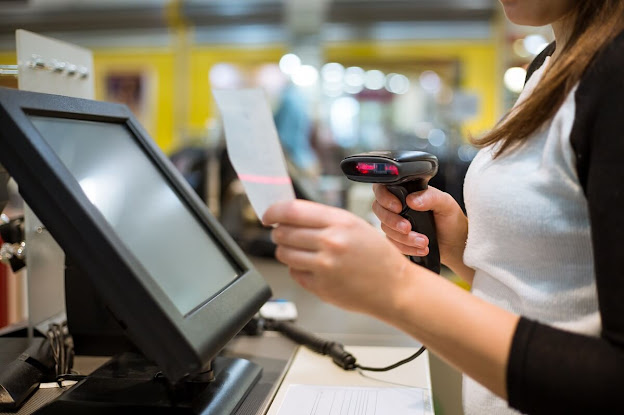Did you know that the first POS system was invented in 1879 in Ohio by a saloon owner called James Ritty? It was a cash register that could record transactions and make the seller's bookkeeping much simpler and easier. Nowadays, these systems are much more complex, have more features and are faster than before. No matter what type of sales business you run, the POS system can make a big difference.
What's A POS System
 |
| source: tagrain.com |
In the past, a POS system was simply a cash register you found at the store. Today, however, it’s an entirely digital system. It's completely modernised, and you can easily check out a customer. In other words, it calculates the price, updates the inventory, makes reports, and makes adjustments all on its own.
In this modern, technologically advanced world, there are many options on the market. Plenty of brands sell these devices and they all have different features, hardware and software and different capacities. It's important that you find and buy from a reliable POS store. The experienced staff can help you make the right decision for you and your business.
What to Consider When Buying
Type of Hardware
Depending on how and where your business operates, you can decide on the hardware system. In some cases, you might not need one. A group of dry cleaners will require physical point-of-sale terminals, whereas an online business with no physical storefronts will not.
There are differences in POS hardware requirements even for companies that take payments in person. For example, if your company offers in-home services to clients, your staff will require mobile point-of-sale devices so they can take payments while they're on the road.
Way of Use
Even if the POS system you buy has amazing features and is functional, if the staff find it hard to deal with, your investment won’t benefit your business. When browsing around for the right device for you, don’t just look at their capabilities. Check the way the user has to operate it. The main task of a POS system is to make things easier. If your employees struggle with it and don’t understand how it works, it’ll backfire and create new problems.
Implementation & Integration
Instead of evaluating POS systems in a vacuum, evaluate how they would fit into your present business operations. Which programmes, applications, and other services do you currently use that a point-of-sale system would need to interface with? How would you use it? Will it manage your online and offline sales? Answering these questions will help you make a decision.
PCI Compliance
PCI stands for Payment Card Industry. Every POS system needs to be equipped to uphold PCI compliance rules. These rules were made to protect payment data and prevent fraud during transactions. One of those requirements, or rules, is for the POS to include a P2PE (point-to-point encryption). This hides the card number of the customer and prevents information leakage.
Know What You Need
Before buying the POS system take note of the things you need the system to do for you. There are tasks you don’t have a problem with, tasks that need an upgrade and tasks that you don’t have a solution to. If you have trouble keeping up with your inventory, look for a POS that is very efficient at this task.
Who Needs a POS System
 |
| source: eurostop.com |
Hospitality
The hospitality sector is a growing, people-facing industry and it benefits a lot by using POS systems. With so many customers going through their stores every day, serving them in a fast and efficient manner is a must. Restaurants, bars, bakeries and coffee shops can keep track of their most and least-selling items and customise the menu. Hotels can tie together the whole management system and when a guest pays at the spa and at the bar, the transaction goes to the central system.
Retail POS System
The retail sector is another one that regularly comes in contact with consumers. The secret to success in this sector is to streamline and simplify the transaction process. Now, you can manage, track, and gather consumer data with the POS system. You can also run a loyalty program which is a great way to gain new customers and increase your sales.
This is a fast-paced industry and efficiency is a big factor. The proper POS system will speed up transactions and leave you with many satisfied customers. Another great advantage is that you can offer discounts and flexible promotions. All you need to do is to buy a good system from the POS store.
Warehouse & Healthcare
The warehouse and distribution industry can benefit greatly from the point-of-sale equipment. They can easily pick, pack, stock and re-stock the products because they have a clear and exact view of the products on their shelves. Healthcare functions of speed and efficiency. Millions of people rely on this industry to get their medication and these machines make everything accessible and much easier.
Other Industries
Public transport like trains and buses use POS systems to make ticket payment easier. Instead of manual transactions and big lines, everyone can buy a ticket through the system and get to their destination faster. The banking industry uses POS systems that allow you to check your balance, make transactions, receive payments and efficiently manage your sales. The government, multi-service businesses, trade and manufacturing also benefit from these systems.
Benefits of Using One
- Save managerial time;
- Improve customer experience;
- Offers e-commerce capabilities;
- Multiple payment types;
- Boosts revenue;
- Provides accurate, real-time data;
- Automatization of tasks;
- Ensures secured information;
- Provides support;
- Keeps track of customer feedback;
- Better inventory management;
- Simple invoicing;
- Multi-store functions;
- Less errors;
- Provides regular updates;
- 24/7 data access.
No comments:
Post a Comment